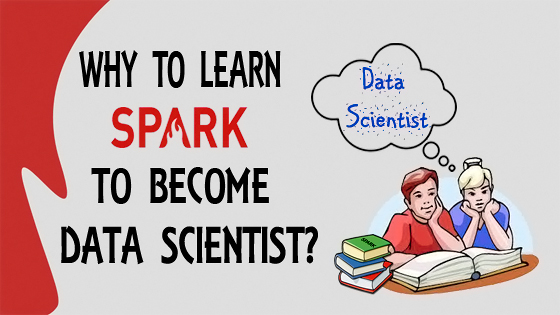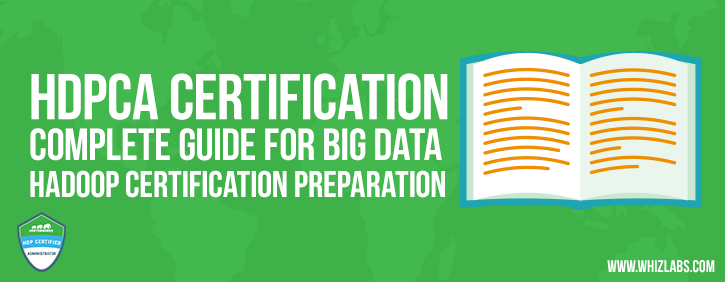Today’s business speaks in terms of data. The more you analyze the data, the more you get insights of business and market trends. With this in mind, data science has emerged as the most in-demand job in the market. A data scientist typically deals with data, its behavior, and statistics which pass through many stages during a standard enterprise process flow. Not to mention Hadoop or Spark are the key tools that help in all phases of data extraction and processing. However, in our previous blog Why-is-apache-spark-faster, we have discussed how Spark is going to take an edge over Hadoop in the near future. Hence, although not a must, still learning Spark is like a cherry on the cake. If you are new to the term Spark, we would recommend you to go to our previous blog Introduction-to-apache-spark.
Know the Role of a Data Scientist before Peeking into Spark
The first thing to remember that being a data scientist is the most critical job role in the Big data field. Markedly a data scientist’s role is coupled with technical and non-technical skills that may include analytical, programming, and mathematical knowledge. As a data scientist, your primary job is to make business data valuable. How? A data scientist is a perfect blend of scientist, programmer, and hacker. He fetches meaningful information out of collected data to understand how a business performs and creates machine learning-based tools or processes to make business more streamlined. In a nutshell a data scientist –
- Selects features, builds and optimizes features using machine learning techniques
- Performs data mining using standardized methods
- Integrates data with third-party sources of information to analyze it
- Enhancing data collection processes to include relevant information and building analytic systems
- Processing, cleaning and verifying the integrity of data used for analysis
- Performing additional analysis and representing results in a clear manner

Learning Spark can Make Your Life Easy as a Data Scientist
Here it is important to realize that Spark is mainly designed for data science and to run its complex machine algorithm in a faster way. Machine learning is an iterative process that needs fast processing. Spark’s in-memory data processing makes that possible and along with below features creates a compelling platform for operational as well investigative analysis for data scientists.
- Spark has MLlib which is its machine-learning library and offers parallelism and scalability almost for free.
- In Spark 2.0 Data frame programming is an important part which will give data scientists a more focused way for structured data processing.
- Spark 2.0 is helpful in distributed data processing for a large set of data without much learning effort. Hence, time-saving for the data scientists.
- Spark is Scala based and easily embeds in any JVM-based operational system, as well as in a REPL which is very similar to R and Python.
- Scala is also a wise choice for statistical computing. By all means, Spark imitates Scala’s collections API and functional style.
- Spark and the base support Scala provide APIs. These APIs supports various tasks, like data access, ETL, and integration. Spark can implement the entire data science pipeline along with Python within this space. Moreover, it is not just the model for fitting and analysis.
- Spark’s GraphX API helps in graph computation by extending Spark RDD abstraction.

Spark is unique in its way with a combination of ETL and analytics whether it is batch or real-time or stream analysis, machine learning, and graph processing with visualizations. It allows Data Scientists to manage the complexities of raw unstructured data sets. Spark can work on a single machine to cluster environment and gives a vision of agile environment to a data scientist.
Best Way to Learn Spark to Become Data Scientist
Online learning Spark is the best way to learn Spark. Not only it gives you to introspect on the subject matter in your way, but also saves your time. As a data scientist, you must map Spark with Data science in a way that will make your learning Spark meaningful for your work. You are not going to play the role of a Spark developer. However, you need to know the underlying functional details of it. Hence, there are few areas you should concentrate on while learning Spark.
- Understand the underlying architecture and API details of Apache Spark
- With Spark 2.0 understanding the difference between RDD with the data framing API
- Get hold of writing efficient jobs using Spark
- Learning Spark code testing correctly
- Understanding Spark as a programming language with its ecosystem and mapping it with Data Science
- Understanding Spark machine learning algorithm and enabling self to build a simple pipeline
- Learn to apply data mining techniques on the available data sets
- Learn to build a recommendation engine
To emphasize, Spark certifications inside the content covers the maximum benefit for the learner.
Which Certification Path to be Followed to Gain Spark Knowledge?
The first question arises here is – Why is certification path? Well, the answer is, any industry recognized certification directs a structured path to get a hold on the subject matter. Not to mention, same applies to Spark also and is the best way to learn Spark. There are few certification courses available in the market which will give you insights of Spark. The most effective one is HortonWorks HDPCD which is for Apache Spark certification. It provides you a complete overview and knowledge of Spark architecture and Spark SQL. Whizlabs HDPCD –Spark developer certification guide covers all the core areas of Spark. In addition to that, online learning spark covers hands-on parts of Spark certifications inside the content to gain a complete hold on the subject matter.
Conclusion
In conclusion, Spark is a go-to-tool for the data scientists. With the growing data sets, Apache Spark has made it possible to save data loss in data science. Speed and platform are the two real power of Apache Spark that also add value proposition to execute Data Science tasks. Spark is a different solution from the myriad other available Big data solutions in the market. Spark makes it possible to pipeline entire analytics from data ingestion to distributed computing. Moreover, with Spark 2.0 data framing feature analytics has gained a new move with much faster performance. Go Whizlabs way of online learning Spark through HDPCD Spark developer certification guide and experience the best out of Data science.
- Top 45 Fresher Java Interview Questions - March 9, 2023
- 25 Free Practice Questions – GCP Certified Professional Cloud Architect - December 3, 2021
- 30 Free Questions – Google Cloud Certified Digital Leader Certification Exam - November 24, 2021
- 4 Types of Google Cloud Support Options for You - November 23, 2021
- APACHE STORM (2.2.0) – A Complete Guide - November 22, 2021
- Data Mining Vs Big Data – Find out the Best Differences - November 18, 2021
- Understanding MapReduce in Hadoop – Know how to get started - November 15, 2021
- What is Data Visualization? - October 22, 2021



Data science. Data science, also known as data-driven science, is an interdisciplinary field of scientific methods, processes, algorithms and systems to extract knowledge or insights from data in various forms, either structured or unstructured, similar to data mining.